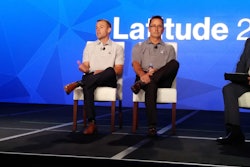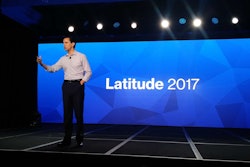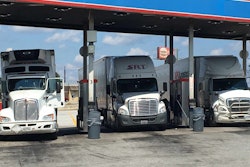At the Latitude business conference, Oct. 23-25, in Dana Point, Calif., transportation and service fleet executives discussed how they use technology to widen the gap with competitors in e-commerce, on-demand logistics and other high-growth markets.
Attendees at the annual event credited their use of a mobile resource management and vehicle telematics platform from Telogis, a Verizon Company, for their ability to differentiate their services and respond quickly to customer needs.
On-demand rentals
Flex Fleet Rental does not have much lead time to fulfill orders from customers, who typically want their rentals “right here, right now,” said Brian Goldhardt, vice president of sales for the Salt Lake City-based company.
Flex Fleet Rental has a nationwide service that fills a gap in the market for companies needing longer-term rentals of ½ to ¾-ton pickup trucks. Most of its customers use truck rentals for project-based work such as construction.
“You have to be prepared for today,” he said. “It is important for us to move quickly and Telogis helps us do that.”
The in-vehicle hardware and software of the Telogis platform is installed at the factory by 15 OEM truck manufacturers that include Mack, Ford, Hino and General Motors, to name a few.
Flex Fleet Rental buys Ford trucks with the Telogis platform installed at the factory. The company uses the technology to quickly locate its inventory and deploy rental trucks to customers. During the recent hurricane relief efforts in the Southeast, the company was able to respond quickly to a surge in demand, he said.
The company gives its customers the option to use tracking and telematics data from its Telogis platform in the systems they already use, whether these systems are from Telogis or one of its competitors, he said. With the integration, its customers are able to manage all of their assets from a single dashboard.
Full-throttle e-commerce
E-commerce is growing at a feverish pace and accounts for more than 10 percent of total retail sales every year. Consumers are purchasing larger items like appliances and furniture online as well.
NEHDS Logistics serves online retailers with a network of distribution centers (DCs) and fleet of 284 Hino trucks. The Bethel, Conn.-based business specializes in the aggregation and final-mile delivery of products weighing more than 60 pounds, said Gerry Burdo, chief executive officer.
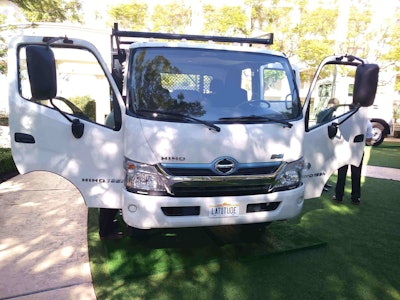 NEHDS Logistics uses a fleet of Hino trucks for its final-mile delivery service
NEHDS Logistics uses a fleet of Hino trucks for its final-mile delivery serviceNEHDS, which stands for Northeastern Home Delivery Service, expanded its use of Telogis when it made the decision earlier this year to self-insure, he says.
By using daily Telogis reports, the company’s safety and compliance manager identifies and trains drivers who are “in the red” for behaviors such as hard braking and speeding, he said.
Since starting the new compliance program in March, NEHDS Logistics reduced its insurance claims 90 percent compared to the same period (March to October) of last year.
“Telogis has really changed the way we do business. I never thought we would have a compliance group and how important that would be in reducing insurance claims,” he said.
NEHDS Logistics directed the newfound savings to driver benefits. With the entire transportation industry facing a driver shortage, he said NEHDS is one of the few fleets in the last mile delivery market that provides drivers with health insurance and a 401k match.
“We have to do that to be more competitive, as there is going to continue to be a scarcity of drivers,” he said. “We use the cost savings to reinvest in people. That has been the biggest focus for us.”
With the technology, NEHDS Logistics is also able to be more proactive in solving customer service issues.
“We are in an age where the customer is always right and social media is always right,” he said. “Letting someone into your home is an emotional thing. If the customer has a bad experience, they will post it on social media.”
Safe driving correlates with good customer service, he explained, and dispatchers at NEHDS monitor for unsafe driving events in real time to identify behaviors and attitudes that could negatively impact the delivery experience.
“We have trained dispatchers to watch drivers for hard braking. If they do it multiple times something bad is going to happen,” he said. “The next step is to put cameras in our trucks.”
The customer experience
The grocery industry has been transformed by e-commerce as well, especially now that Amazon is getting into the business with the acquisition of Whole Foods.
Grocery retailer Hy-Vee, based in Des Moines, Iowa, operates 245 stores in Midwestern states. Three years ago the company did not have an e-commerce offering but “we saw the writing on the wall,” said Kurt Hasson, vice president of IT.
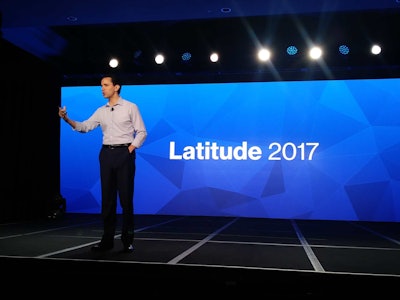 Andres Irlando, CEO of Verizon Telematics, spoke during the Telogis user conference, Oct. 24
Andres Irlando, CEO of Verizon Telematics, spoke during the Telogis user conference, Oct. 24“There is a lot of pressure to move quickly and maintain our market share,” he said. Hy-Vee built its own platforms for e-commerce and order management.
Last year, Hy-Vee created a dedicated e-commerce fulfillment center in Des Moines to route orders for all 20 stores in this market. The goal from the beginning was to automate routing and give its customers the chance to choose a delivery time that works best for them.
“It became a much more complicated program, and that is what brought us to Telogis,” he said.
Hy-Vee is getting close to making this goal a reality by using an application program interface (API) from Telogis. Its order management system can automatically communicate the order details to the Telogis’ RouteCloud optimization software.
In return, RouteCloud instantly computes routes and sends the plan back to Hy-Vee’s computer systems.
During the checkout process, Hy-Vee customers will soon be able to reserve a time slot for delivery, he said. The customers will see which time slots are available and be given discounts for choosing time slots that result in lower delivery costs, based on how the routes are shaping up in Telogis RouteCloud.
“This will add more value on the customer side by picking a time slot. Ultimately, it will give the routing engine a better problem to solve. Customers will feel good about getting a cheaper price,” he said.
Hy-Vee is also using an API from Telogis called LiveETA. As a driver starts a delivery route, the customers on the route will receive an ETA. As things change, the customers will receive updates.
“This will evolve to be an Uber-like experience where you can track the driver right up to your house,” he said.
Onwards to autonomy
As ground transportation continues to advance towards autonomy, at least one company at Latitude announced it is planning to use technology to replace drivers.
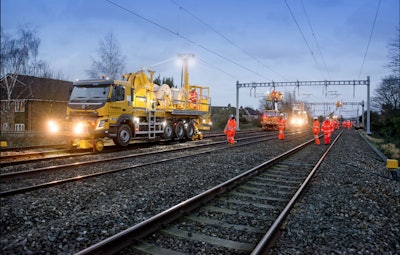 Balfour Beatty plans to have autonomous trucks in 10 percent of its fleet by 2025
Balfour Beatty plans to have autonomous trucks in 10 percent of its fleet by 2025Railroad services provider Balfour Beatty has seen a decline in the number of workers who are interested in construction, said Derek Piwonka, division manager of equipment.
“We will pursue robotic technology to replace people. We can’t find people to do that kind of work. Anyone in the trucking business knows how difficult it is to find drivers,” he said. “We are investing pretty heavily. By 2025, we think 10 percent of our fleet will be fully automated.”
In the meantime, Balfour Beatty has seen employee productivity improve by using the Telogis system to track and monitor driver activities. The first group of employees to use the technology was a union group in southern Calif.
Once the employees knew the technology was in their vehicles, they “were actually going to the jobsite, working the entire day, and taking a 30-minute lunch,” he said. “They knew they can’t get away with it anymore.”
The company has realized saving of $250,000 from this union group alone.
“It took no effort on our part to correct them on bad driving habits, either. Drivers are able to look at how other guys are driving in the fleet. They want to be in the 100 percent group. We have parimutuel wagering going on in some offices.”



